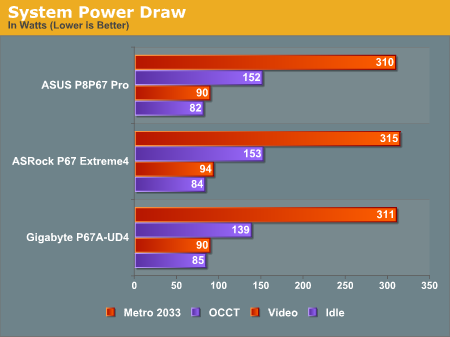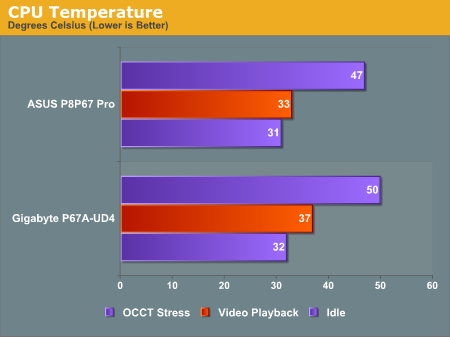The Battle of the P67 Boards - ASUS vs. Gigabyte at $190
by Ian Cutress on January 20, 2011 4:15 PM EST- Posted in
- Motherboards
- Gigabyte
- Asus
- P67
| Test Setup | |
| Processor |
Intel i5-2500K ES – 3.3 GHz (3.7 GHz Turbo) 4 Cores, 4 Threads, 6MB L3 |
| Motherboards |
ASUS P8P67 Pro Gigabyte P67A-UD4 |
| Cooling | Corsair H50-1 Water Cooler |
| Power Supply | Enermax Modu87+ 600W 80PLUS |
| Memory |
Patriot Viper Xtreme DDR3-2000 9-10-9-27 2x4GB Kit, 1.65V Patriot Viper Xtreme DDR3-2133 9-11-9-27 2x2GB Kit, 1.65V Corsair Vengeance DDR3-1600 9-9-9-24 2x4GB Kit, 1.50V |
| Memory Settings | Patriot Viper Xtreme DDR3-1333 9-9-9-24 2x2GB |
| Video Cards | XFX HD 5850 1GB |
| Video Drivers | Catalyst 10.12 |
| Hard Drive | Intel X25-M 80GB SSD Gen2 |
| Optical Drives | LG GH22NS50 |
| Case | Open Test Bed – CoolerMaster Lab V1.0 |
| Operating System | Windows 7 64-bit |
| USB 2/3 Testing | Patriot 64GB SuperSonic USB 3.0 |
Power Consumption and CPU Temperature
Power consumption was tested on the default system as a whole with a wall meter connected to the power supply, using a dual GPU configuration. This method allows us to compare the power management of the UEFI/BIOS and the board to supply components with power under load, and includes typical PSU losses due to efficiency. These are the real world values that consumers may expect from a typical system (minus the monitor) using these motherboards.


Neither system does too badly in power consumption readings, but the Gigabyte is behind on temperature deltas. This could easily be attributed to the mounting - while every attempt is made to repeat the mounting technique, there is always a range of statistical variation, so the 2-4ºC difference is nothing obvious to be concerned about.










137 Comments
View All Comments
James5mith - Friday, January 21, 2011 - link
One big giant reason to use the Asus board? Intel® 82579 Gigabit EthernetAn Intel PHYS on an Intel board means one less PCIe lane taken up by the NIC. Not to mention, it's Intel not Realtek.
Mumrik - Friday, January 21, 2011 - link
‘if I’d rather take a $150 board rather than a $190 board, why are there $300 boards available?’No, the question is why you don't focus more on reviewing the lower end boards. Motherboards have become too expensive, especially when you consider how much is being moved onto the CPU. These were Asus' and Gigabyte's midrange boards. I'd love to hear more about the two below them in the two companies' lineups. Let's hear if there's a reason not to pick the 130-150 options.
erple2 - Friday, January 21, 2011 - link
I think the question is still extremely valid - if the 150 dollar board gives you all of the performance of the 190 dollar boards, where does that leave the 300 dollar boards?You also bring up another good question - what can the 150 dollar board buy you that the 100 board doesn't have?
My assumption is that there are various features that simply don't exist on the sub-100 dollar boards.
BTW, I'm not sure that motherboards are really all that expensive. At least, not beyond "standard inflation". The same level of features (of the day) cost about the same amount as they do today, I think.
7Enigma - Tuesday, January 25, 2011 - link
If this is standard inflation we are in for a world of hurt....sweetspot - Friday, January 21, 2011 - link
Just me but id prefer 70fps in my games if sound quality was excellent vs 75-80 FPS and unusable sound mobo parts. And or have to pay additional for add on pci sound card cash which defeats the savings shown using the asrock 150 mobo yet sounds bad so pay 50-70 more for add on card, vs the 2 190 boards sounds are good, So the value set he describes in this review of the 40 dollar cheaper board is totaly stupid since he failed to show the boards major components correctly ( Yes sound on a mobo is consider a major component piece of the many).Sure reader can go elsewhere to get the info but the point of the review sites is to cover basic parts so people dont have to web hop all day for those details.
faxon - Friday, January 21, 2011 - link
I wanna see a review of these vs the P67-GD65 from MSI. its the cheapest 8 SATA port board on the market and other sites have been saying it looks pretty good, wondering what you guys think before i buy it thoughHauntFox - Friday, January 21, 2011 - link
I just built a new system with this Asus board, it is quite nice, except I do not like the sata ports that point to the front. I barely have enough room to plug a sata cable into them with my case because the drive cage is in the way.RussianSensation - Friday, January 21, 2011 - link
Legit Reviews did a comparison, which can be found here: http://www.legitreviews.com/article/1500/1/1) Realtek vs. Intel - Besides a 3% lower CPU performance, the throughput is hardly any better wtih Intel. Also, unless you are networking multiple computers, we aren't going to be hitting 900+MB/sec in Internet speed.
2) 16x/4x vs. 8x/8x in CrossFire - Since P67 chipset runs PCIe 2.0 at full speed unlike P55 chipset, the PCIe 4x slot off the P67 chipset actually has 2x the PCIe bandwidth compared to P55 16x/4x boards. Overall, when testing with HD6950s in CF, the performance difference is almost nonexistent.
So overall, the stock P8P67 board looks like the one to get for those running single-GPUs.
Exodite - Monday, January 24, 2011 - link
I'd get the ASUS just for the Intel LAN solution TBH.I can't say whether it's hard- or software, or a combination of the two, but Realtek ended up as a real step down from the Marvell solution in my previous motherboard and I'd avoid it in the future if I can.
Most notably I went from a 30-40ms latency in WoW to 100-120ms with the Realtek. This was only recently rectified, well mostly rectified, with a driver update.
So for me personally i'd definitely be worth it. It's nice to see a review that tests the LAN solutions but frankly just testing throughput and CPU usage is rather disingenuous as latency and jitter probably play a larger role in most network-related usage.
fixxxer0 - Saturday, January 22, 2011 - link
how come there are no tests showing the SATA 6.0 speed comparisons?